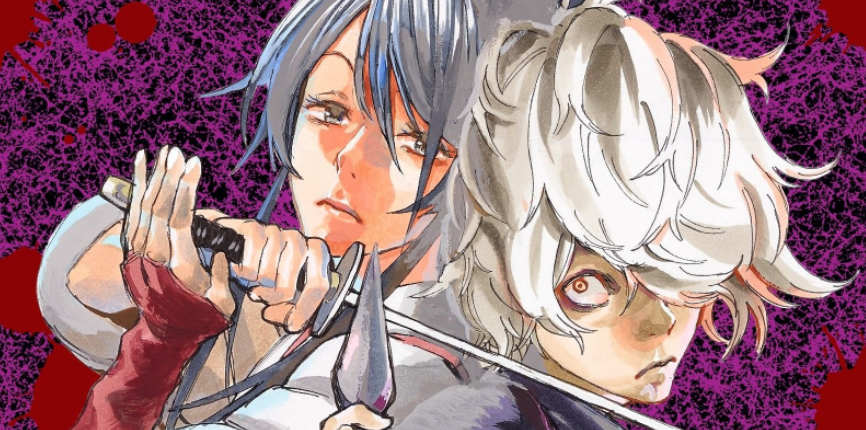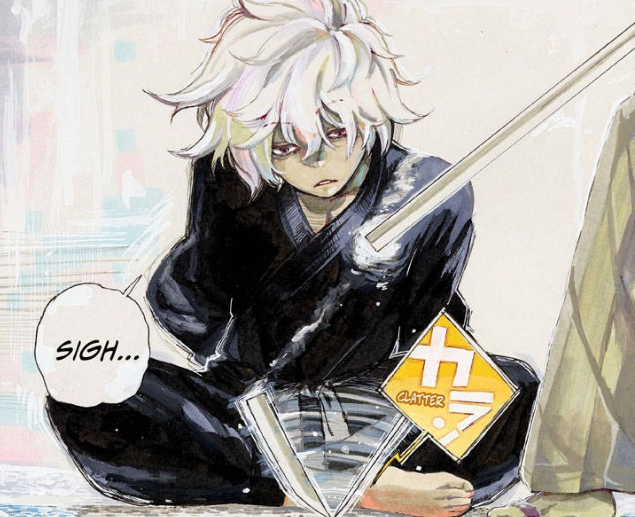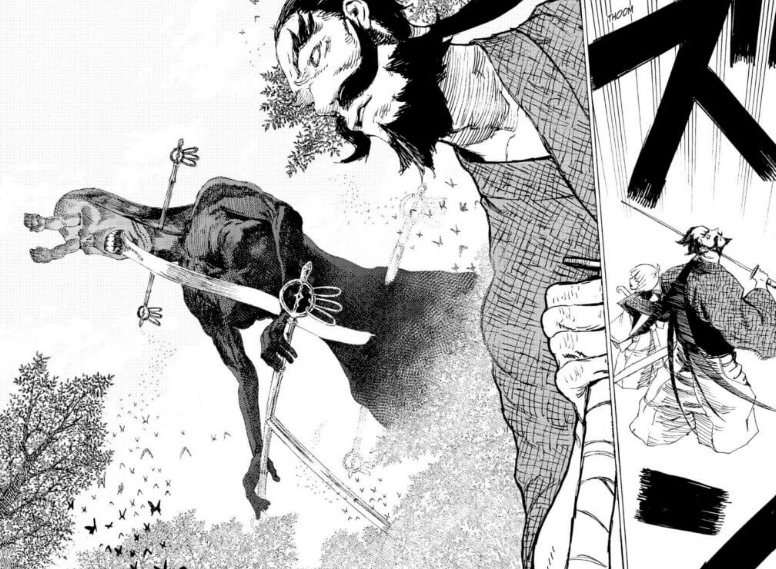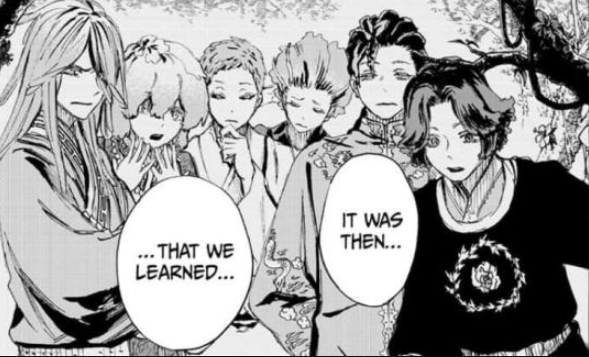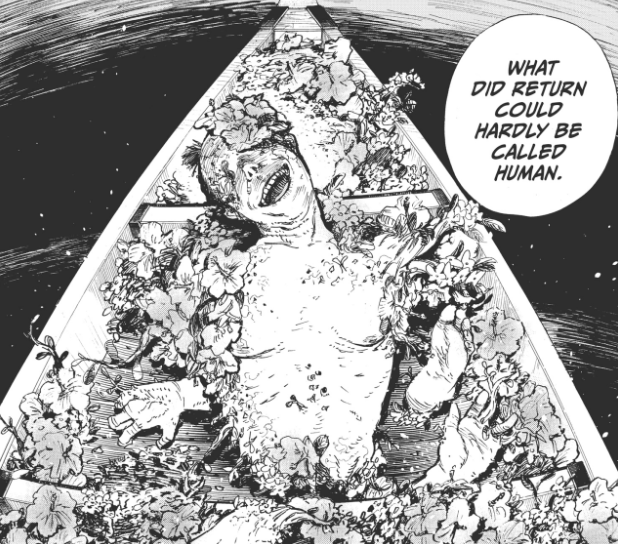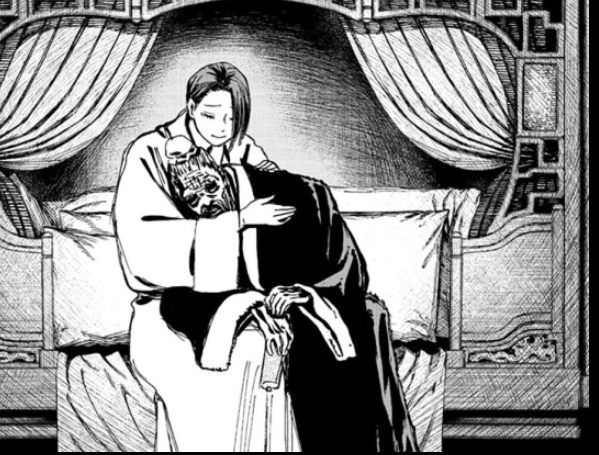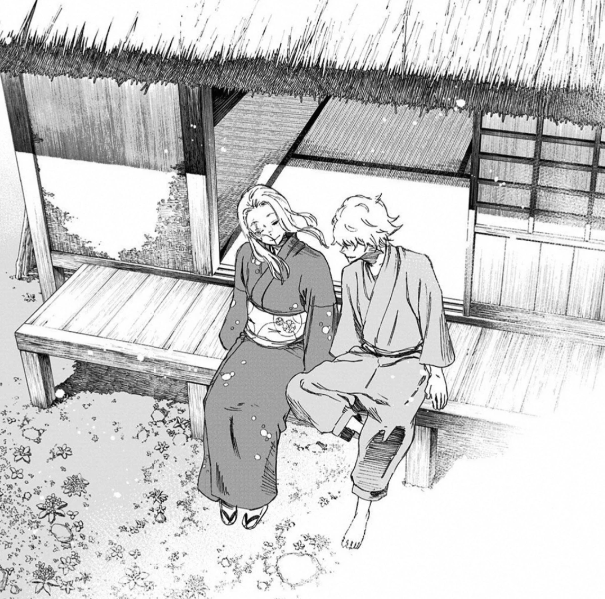Hell's Paradise: Jigokuraku Review (spoilers)
Gabimaru and Sagiri
This series has been on my radar for a while, but the anime announcement brought it to the top of my to-read pile. I devoured all thirteen volumes in three days. I’ll just say from the start that I absolutely loved it, and it’s been a while since a shonen has captivated me so much.
Set in Edo-era Japan, Hell's Paradise: Jigokuraku focuses on Gabimaru the Hollow, a merciless shinobi from the infamous Iwagakure Village. To ensure his loyalty, he is betrothed to the clan leader’s daughter. Yui is kind and thoughtful, and her character changes Gabimaru immensely. His request to leave the village to live a peaceful life with Yui is met with accusations of betrayal, and he is scheduled for execution by the Shogunate. His uncanny inability to die during his execution is due to his strong desire to see his wife again.
Man too in love to die.
The bizarre and humourous failed execution leads to his new assignment: join a ragtag group of convicts to a deadly supernatural island while tethered to a samurai monitor, and find the Elixir of Life. The successful convict will be granted a pardon to freedom. What appears to be a mildly risky adventure turns into a paranormal Battle Royale: the convicts kill one another, they kill their individual samurai charges; the samurai kill their assigned convicts, and everyone gets ripped to shreds by the deadly spiritual guardians of the island, silent and overpowering, and appearing as amalgamations of various Eastern religious icons. The unlikely group that remains is forced to work together if they want to leave the island alive.
It’s not the bloodbath and action-packed fight sequences that interest me with this manga (although those are all written and drawn beautifully), but the characters themselves, and the intricate way in which their bonds are pulled, broken, mended, and re-established throughout the story. Gabimaru is already a multi-layered character: his first appearance is stoic, aloof, unfeeling, still attached to his ruthless ninja past. But as the chapters progress, and he is left to dwell on his desires for Yui and his wish to see her again, his steely demeanour weakens and he begins to accept others and rely on strengths greater than his own.
Just another day on Crazy Pirate Island
Gabimaru’s monitor, Sagiri, is the foremost female swordsman of the famed Yamada clan. Back home with the clan, Sagiri constantly contests with sexist beliefs about her position in society. She also battles an internal conflict of low self-esteem and feelings of inadequacy, but her sword is sure, and Gabimaru notices her skill and pays her respect. The ninja’s ability to see her as an equal, and his tender love for his wife, challenges Sagiri’s prejudice towards Gabimaru, and eventually all the other convicts on the quest. This transformation is replicated throughout the island, and by the time Gabimaru and Sagiri encounter the other pairs, they find amicable relationships of begrudging respect between the samurai and their charges.
It’s common in battle manga to have a particular energy system with which to fight and execute special techniques: in Naruto, its Chakra, in Hunter x Hunter, it’s Nen; Shaman King has furyoku (mana), and Jujutsu Kaisen centres around jujutsu. Hell’s Paradise utilises Tao, a system of opposites, where both strength and weakness are needed to defeat an opponent. This is why Gabimaru’s fall into humanity, whilst derided by his former shinobi comrades, is what makes him a force to be reckoned with. Time and time again, characters who are unable to accept their weaknesses and acknowledge their own fallibility are defeated. Sagiri’s naturally doubtful disposition teaches Gabimaru how to see strength in weakness. The mechanics of Tao allows the characters to have much self-reflection and development as they confront their shortcomings, and accept them.
Lord Tensen
Whilst we are led to believe that the villains on the island are the strange religious monsters, a humanlike pair is discovered by sibling criminals Toma and Chobe. This ethereal pair, switching between male and female bodies, instantly defeat the brothers. They cannot be killed as their bodies immediately regenerate; they are fast, and their mastery of Tao—an unknown power at this point—makes them godly. Altogether, these creatures are collectively called Lord Tensen, and there are seven of them to defeat. Our antiheroes are forced to master Tao if they want to kill Lord Tensen and leave the island.
The secret to Lord Tensen’s power is the Elixir of Life, which doesn’t exist as the protagonists originally believe. Lord Tensen uses the energy within humans to create a substance called Tan, which explains why so many of the Shogun’s men have never returned from the island. Their bodies transform into plants, are compressed, and made into Tan. The reveal of the true Elixir of Life is just one shock among many in the series, and the island’s contestants are forced to modify their goals and battle strategies as they discover Tensen’s real goal: sail to mainland Japan and create Tan out of the humans there, all to revive their creator, Xu Fu.
Hmm. Tan <3
The mechanics of Tao creates battles that are both psychological and physical. Gabimaru’s biggest internal conflict is the suggestion that Yui might not even exist, but is merely the genjutsu of Iwakagure’s leader, a means to keep Gabimaru tethered to the village and its ideals. As readers, we’re left in the dark as to Yui’s nature, but Gabimaru is certain she’s real. He explains his reasoning in a beautifully poetic sequence in chapter 52 that I have to quote as any paraphrase won’t do it justice:
What I can remember … are little things.
Like… her voice. Light airy, slow and flowing. I don’t know… how to describe it.
And how her eyes narrowed when she smiled.
Her long, soft fingers.
And the way her hair smelled when blowing in the breeze.
On nice days, when I’m sitting out in nature … I can sense her amongst the sun and grass and flowers.
Even now … Yui.
That’s her name … Yui. She’s no illusion. I can feel it. That might not be the proof you want, but it’s all I have.
The only way to be sure… is to make it back home to her.
Yui is Gabimaru’s weakness and strength. Remembering her is what allows him to persevere through the many trials of the island. The sense of humanity she brings him helps him to master Tao. But his love for her also causes him to stumble. At the culmination of the fight, the true leader of Lord Tensen, Rien, Xu Fu’s wife, almost obliterates our characters. Gabimaru is tasked with sneaking aboard Rien’s boat and destroying Xu Fu’s body, which would then rattle her resolve and allow an opening for the other fighters to defeat her. On the ship’s deck, Gabimaru sees wedding garments, quite clearly set out for Rien and Xu Fu upon his revival. In horror, Gabimaru realises that Rien’s entire goal has been to see her husband again. He falters, unable to destroy the body, and it falls on Shugen, the frighteningly devout samurai, to complete the task.
Woman too in love for husband to die.
During the height of her ferocious anger, Rien demands to know why Gabimaru hesitated. When he admits to empathising with her desires, Rien concedes defeat, the last of her powers draining, all Tan and Tao spent fending off the formidable convicts and samurai. I was conflicted on this resolution when I first read it: whilst I appreciated that Gabimaru and Rien were connected by their shared love of their spouses, and that they saw the same weakness in each other, and I was even happy that Rien admitted defeat in the way she did, it was preceded by an impressive display of her power where she appeared to kill both Gabimaru and Sagiri. That Rien instantly reversed the damage slightly cheapened those shocking pages.
Regardless of the slightly disjointed final battle, the story rewards us with Yui. She does exist. Yui awaits Gabimaru beneath a curtain of cherry blossoms, a meeting place arranged by Sagiri as a final thank you. And although we see Yui’s smiling face, Gabimaru’s is hidden, besides a tease of tear-drenched cheeks. I thought it was a nice touch to give Gabimaru a final dignity after having his soul stripped bare so many times throughout the story.
Just lovely
And on the final page, as Sagiri and the coquettish kunoichi Yuzuriha finally visit Yui at her new home with her husband, we find Gabimaru the Hollow sleeping soundly, which is something he was never been able to do before. It gave me the same satisfaction I felt at ending of Tokyo Ghoul, when fresh-faced family man Kaneki emerges from his room, all troubles of the past firmly behind him. Never did I think an image of a sleeping ninja would cause me so much joy.
I already know this is a manga I will re-read, and although I enjoyed reading it on the Viz website, the cover art alone makes this a must-buy for a physical collection.
A no-brainer 10/10.
